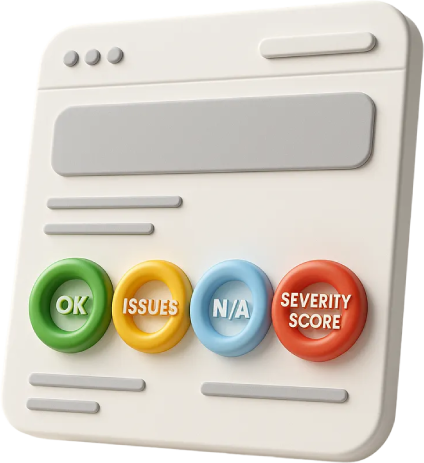Understanding Legitimate vs. False Flags
Determining whether Google has genuinely detected malware on your site or if they are flagging a software element they dislike can be challenging. Occasionally, they mistakenly flag sites for this policy violation.
It’s important to consider the possibility that there might be malicious content on your website or that it could have been compromised.
Legitimate flags for malicious software often stem from hacked websites, where harmful software is injected by unauthorized individuals without your awareness.
On the flip side, false flags can happen when Google misinterprets compliance issues or mistakes certain elements as threats. For example, our team faced a scenario where a client’s payment processor system triggered a flag due to specific code injection.
Despite the code being harmless, adjustments were needed to align with Google’s standards.

Check Your Website for Google Ads Compliance Issues
Our Suspension Website Scanner analyzes your site for common Google policy violations that can trigger ad disapprovals or suspensions. Get clear insights in minutes and know where to focus next.
Scan My Website
Navigate Beyond Your Suspension with Confidence
We have seen businesses improve their chances of reinstatement by adhering to the following guidelines. It’s not just about following rules; it’s about positioning your appeal for success.

Don’t yell at Google
It’s incredibly frustrating to be told that you can’t advertise and to get zero details about why or how you can fix it.
But — yelling at Google via phone or email will hurt your case.
The Google representatives you interact with are NOT the people who decided to suspend your account, and they are also NOT the people who will decide to reinstate it.
They’re just trying to do their job, sometimes with limited training about Google’s policies.
So always try to approach the situation with respect.

Be Careful about Hiring an “Expert” from Fiverr, Upwork, etc.
There are individuals who advertise via gig platforms such as Fiverr and Upwork that they will help get Google Ads accounts unsuspended.
Some of these individuals may be legitimate, but we’ve also seen some suspension problems compounded by “experts” from these platforms who have tried and failed to get clients back on Google.
Approach with care, and vet anyone you work with in this space. Look for reviews from real businesses they helped get back online.

Don’t Submit Appeal after Appeal
Google doesn’t have an official limit on the number of appeals that you can submit, but the more unsuccessful appeals you submit, the less likely it is that your next appeal will be reviewed.
Google expects you to submit new, relevant information if you resubmit an appeal. “Spamming” the appeal form will make your life worse.
The Key to Overcoming a Malicious Software Suspension
The Key to Overcoming a Malicious Software Suspension
At StubGroup, we specialize in navigating the complexities of Google Ads account suspensions for malicious software.
That’s why we’re here to help.
If you are struggling with a ad disapproval for this type of policy issue, here are some ways to address it.
Steps to Take to Avoid Malicious Software Policy Violations
Even if an issue may not pose a genuine threat, keeping your website security and software up to date is important to mitigate the risk of being flagged for one of these issues. Here are some precautions you can take to avoid this type of policy issue:
Frequently perform scans on your website to check for security issues or malicious links. There are a lot of vendor websites that can perform these scans for you and send you reports.
Update your security and software as often as possible to prevent hackers from compromising your website.
Monitor your plugins and use reputable sources when choosing a website platform to mitigate the risk of potential vulnerabilities.
It’s good practice to regularly change your passwords across your advertising accounts and tools. You can also use a password manager to help monitor any leaks.
We Fix All Types of Google Ads and Google Merchant Center Suspensions
Suspended For Counterfeit Goods?
This means Google considers that your ads, website or app mimic the brand features of a product in an attempt to pass themselves off as a genuine product of the brand owner.
Suspended For Malicious Software?
Suspended For Malicious Software?
This means Google considers that your ads and site or app either hosts or links to malicious or unwanted software, regardless of whether the software is promoted through the Google advertising network.
Suspended For Suspicious Payments?
This means Google considers that your account’s payment activity has been suspicious or fraudulent.
Suspended For Circumventing Systems?
This means Google considers that you engaged or attempted to engage in practices that circumvent or interfere with Google’s advertising systems and processes.
Find Out If We Can Help You
Every Google Ads suspension is unique, so let’s discuss your situation and if/how we can help
We Guarantee 100% Privacy
Your information will not be shared
Call Us with Questions!
Frequently Asked Questions About Google Ads Suspensions
Choose StubGroup to Get Your Google Ads Unsuspended
Our team has experience dealing with Google Ads suspended accounts and knows how to get them reinstated. Here are a few other reasons to work with our team:




